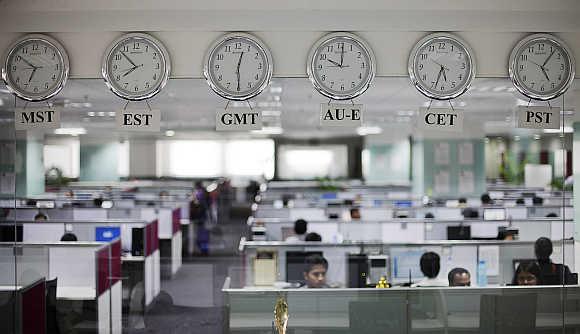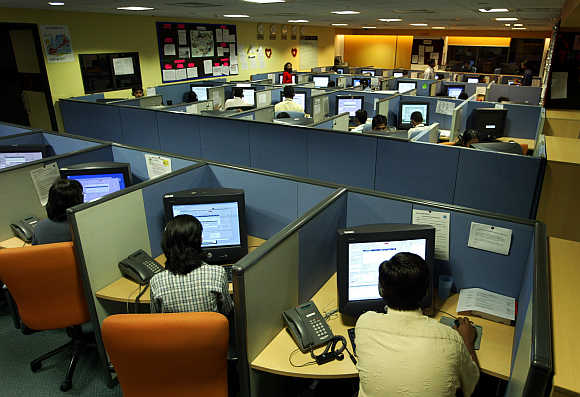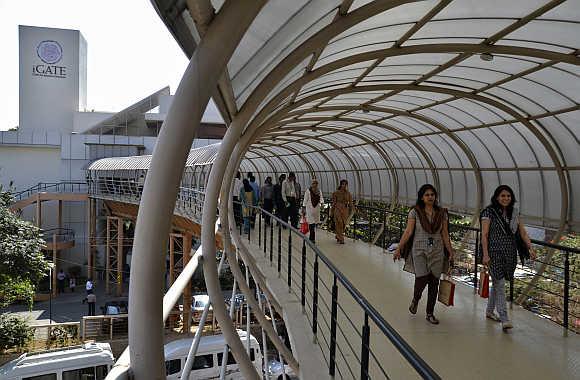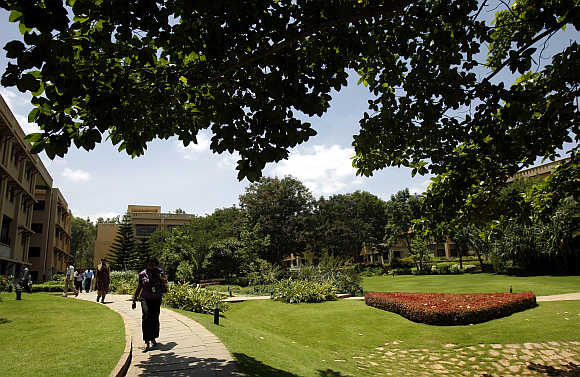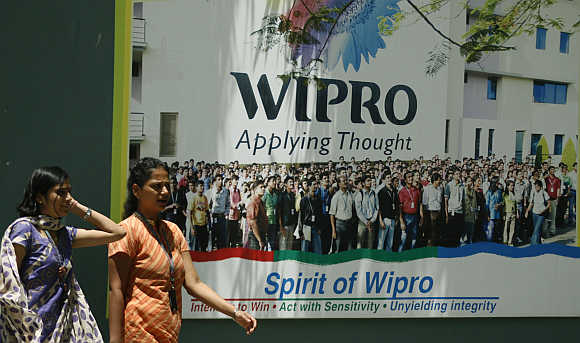 | « Back to article | Print this article |
India needs to diversify away from low-cost programming
India’s success in information technology and IT-enabled services exports as well as the rise of IT majors like Infosys, Tata Consultancy Services, and Wipro formed the backbone of the emerging economic power. A fortuitous combination of circumstances saw almost uninterrupted impressive growth in this sector for nearly two decades.
Indian IT and ITES rode the tailwinds of a fast growing global economy, combined with increasing use of IT in all sectors of the economy across the world. This trend further benefited from relatively liberal trade regimes for IT and ITES in major markets such as the US and Europe.
But India’s position as the back office of the world is now being threatened by three fundamental factors. First, the Indian model of services delivery is overly IT-centric, focusing on basic coding and programming.
However, the global market is now demanding skills in a host of other professional and technical services such as accounting, legal services, animation and industrial design, to name just a few. New services functions that require professional skills can now be delivered remotely, thanks to global technology. The emergence of “big data” that requires a large pool of trained professionals to manage, analyse, interpret and customise it is providing a huge economic opportunity.
Indian firms have been slow to react to these opportunities, and also have been constrained by lack of adequate skills.
Click NEXT to read more...
India needs to diversify away from low-cost programming
Reflecting this IT-centric focus, Indian trade policy in services has become hostage to this limited vision, with an over-emphasis on its trade negotiation priorities on Mode 4 (or liberalisation of the movement of people) - a critical demand of the Indian IT lobby.
Second, increasing automation of basic IT and ITES such as programming, coding, and even call-centre type activities, would mean that export opportunities in these types of services could eventually dry up. This means that unless the Indian IT and ITES sector quickly starts to adopt to changing global demand patterns, it faces the risk of becoming marginalised.
Finally, the relatively liberal trade regimes are unlikely to remain as liberal. The new US immigration Bill may demand efforts to first hire Americans; if none are found, then temporary visas would be provided, but with salaries matching those of the US at defined skill levels. This has caused a lot of anguish to Indian IT companies operating in the US with abnormally low-paid Indian H1-B visa workers.
Regulations governing the cross-border delivery of professional services will definitely increase as more and more work in accounting and legal services are done globally, instead of within a country’s borders.
Click NEXT to read more...
India needs to diversify away from low-cost programming
Cross-border flow of data, critical to the outsourcing of services, would become more regulated and difficult as countries impose stringent data security and data privacy laws. Technology that can monitor server activity and regulations on reporting the flow of data that crosses borders can also potentially enable what so far has been considered unfeasible in regulating cross-border services, i.e. the development of tariff barriers on such services.
A future where countries can impose a “duty” on every packet of data sent and received electronically across the border through secure commercial servers of firms is not that far off. How can India adapt? It does have a competitive advantage in that the average salary in India for entry-level skilled professionals is still far lower than most countries, just 19 per cent of US wages for comparable skills.
Reforms in domestic services regulation should be the first item on the agenda. India remains a highly regulated and protected services market. The lack of reforms in services like accounting and legal services have prevented Indian professionals from effectively participating in global networks of firms through which these services are offered.
Regulations restricting Indian firms from incorporating (by mandating partnerships as a form of business), offer single-window services (by not allowing association between different types of professionals), and advertise and solicit business have prevented them from attaining economies of scale and global ambitions.
Click NEXT to read more...
India needs to diversify away from low-cost programming
A firm mandate towards reform-oriented regulation of professional services with a view to making them globally competitive, and a trade and export promotion policy designed to make India a professional and knowledge services hub is a critical if India is to look beyond IT services.
The second big reform is in the area of skill development. The changing landscape of IT and ITES requires far greater emphasis on a diverse range of expertise and domain knowledge than mere programming that call centres ask for.
The government and the private sector together will have to come up with a strategic vision that can convert India’s large output of natural science, arts, and commerce graduates into employable resources. This investment can create millions of well-paying services jobs.
The government would also have to work with the over 1,000 private engineering colleges that over-emphasised programming and coding at the expense of hard skills in engineering, and help reorient them to meet the changing demands of industry.
Finally, India should leverage the many regional and preferential agreements it’s negotiating to insist on developing disciplines that would ensure the following three objectives.
Click NEXT to read more...
India needs to diversify away from low-cost programming
First, data privacy and data security regulations would not emerge as barriers to cross-border trade. Second, such agreements should include disciplines governing professional services that ensure that Indian-trained and certified professionals are allowed to deliver most types of accounting, financial, legal, health and other technical and professional services without any barriers or restrictions.
Third, to the extent possible, India should seek for the short-term movement of professionals that are more liberal than what is already available on the ground. While recently concluded foreign trade agreements have claimed greater Mode 4 commitments, they are largely notional gains on paper.
An example of real facilitation would be if a partner country agrees to visas on arrival for Indian professionals for short-term visits lasting up to three months, or the creation of special visa categories just for Indian applicants.
Click NEXT to read more...
India needs to diversify away from low-cost programming
Nothing also stops India from pursuing a similarly proactive, if somewhat less ambitious, strategy at the World Trade Organisation. While the more traditional IT and ITES functions are being made obsolete by automation, the increasing focus on data management and “servicification” of global manufacturing with emphasis on customisation, technical support and after-sales service are creating new opportunities in more skilled professional services required for such functions.
India, with the right policies in place, can ride this wave to create an entirely new generation of skilled citizens that drive forward economic growth for the next several decades.
The writer, a trade economist, was Economic Adviser to the Ministry of Commerce
